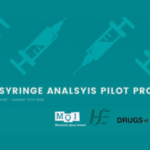
July 28th is World Hepatitis Day. This year’s theme is I Can’t Wait, encouraging everyone to get tested and treated for Hepatitis. Merchants Quay Ireland is proud to be part of the National Hepatitis C Treatment Programme.
In 2021, 59 unique clients engaged with MQI’s Hep C programme with 383 visits in total, representing a 40% increase from 2020.
Daniel Santos is the HepC project worker at MQI. Daniel works as part of a multidisciplinary team, including GPs, nurses and harm reduction project workers to raise HepC awareness, and to support clients in accessing HepC prevention testing, and HepC treatment and care.
Daniel uses a health promotion approach to educate and empower clients with enough information to make informed decisions about their health in relation to HepC.
At Merchants Quay Ireland, we support people who are homeless, sleeping rough, and/or dealing with drug and alcohol dependency. Many of our clients are intravenous drug users, and so are at high risk of contracting Hepatitis C.
Hi Daniel! Can you explain what Hepatitis is?
Before we talk about hepatitis, we must talk about the liver and understand its functions. The liver is one of the largest and most important organs in the body. It works by filtering and processing food, alcohol and medications; and producing bile, a fluid which helps to digest fats and eliminate waste products. It is essential for living. If the liver stops working, the whole body shuts down.
So, Hepatitis is an inflammation of the liver. There are five types of viral hepatitis: A, B, C, D and E.
Hepatitis B, C and D are acute, chronic infections which put sufferers at high risk of death from cirrhosis and liver cancer. Transmission usually occurs through blood, contaminated medical equipment, sexual contact, or through birth as they can be transmitted from mother to baby.
“Hepatitis is an inflammation of the liver. If the liver stops working, the whole body shuts down.”
How is Hepatitis C diagnosed? What are some of the symptoms?
Over the COVID-19 pandemic, we all learned a little bit about virus testing, and names such as antibody, antigen and PCR tests became really common. We’re able to test for the most common types of hepatitis using PCR and antibody tests, however they are blood based tests.
Some common symptoms of HepC are a high temperature, tiredness, loss of appetite, nausea and stomach pains. Some people also experience jaundice, which is when the skin and eyes take on a yellow appearance. However, it’s important to note that some people experience no symptoms, and so it’s vital to get tested.
“Some people experience no symptoms [of HepC], and so it’s vital to get tested.”
What differentiates Hepatitis C from the other forms of Hepatitis?
HepC occurs when infected blood finds its way into your bloodstream. 70% to 80% of the time, it is transmitted through shared needles, razors, nail clippers, tweezers, or personal hygiene equipment. That’s why harm reduction strategies such as needle exchange are so important and vital to prevent HepC transmission in people who use drugs.
HepC is much harder to catch through sex than hepatitis A or B, but it is becoming more common.

Talking specifically about HepC, is there a cure for it?
Yes there is a cure for it! After lots of scientific research, the DAA regime was approved in 2014. DAA stands for Direct Acting Antivirus, and this medication works by targeting different steps of the viral replication process. The treatment is straightforward and non-invasive. It simply consists of tablets taken daily for eight to twelve weeks, and is highly effective in eliminating the virus in over 95% of people.
“HepC treatment is straightforward and non-invasive. It can be cured in eight to twelve weeks.”
What are some ways to avoid Hep C transmission?
After a patient is cured of HepC, they won’t have any immunity to protect them from catching it again. But you can lower your risk of contracting HepC again by avoiding blood-to-blood contact with other people.
Some steps you can take include:
- Never share needles or syringes.
- Never let anybody else use your toothbrushes, razors, nail, hair clippers, and scissors or any personal items that may be exposed to blood.
- Use protection during sex.
- Avoid direct exposure to blood.
- Only use a licensed tattoo and piercing artist who utilises the correct sanitary procedures. A new, disposable needle and ink should be used for each customer.
MQI provides free, confidential HepC screening and treatment at our Open Access Services, located at 12-13 Merchants Quay, Dublin 8.
For more information on HepC, visit the HSE website.
More information is available here.
The HSE’s National Hepatitis C Treatment Programme (NHCTP) was established in 2015, following a key recommendation from the 2014 Department of Health Report ‘A Public Health Plan for the Pharmaceutical Treatment of Hepatitis C.’ The NHCTP is a multi-annual public health plan which aims to provide treatment across a range of healthcare settings to all persons living with Hepatitis C in Ireland.
NHCTP and MQI aim to develop this service in line with the recommendations of the NHCTP Strategic Plan 2020-2026 ‘Working Towards the Elimination of Hepatitis C in Ireland.’

